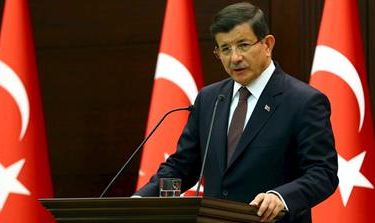Davutoglu: Turkey ‘not a concentration camp’
Turkish PM says Europe cannot expect his country to keep Syrian refugees permanently in exchange for money.

Turkey is “not a concentration camp”, Prime Minister Ahmet Davutoglu said a day after holding talks with German Chancellor Angela Merkel on the refugee crisis.
In a live TV interview on Monday, the Turkish prime minister said his country would not host refugees permanently to appease the European Union, which seeks Turkish cooperation on an action plan to slow down the stream of people into Europe.
Keep reading
list of 4 itemsUK passes bill to deport asylum seekers to Rwanda: What’s next?
‘Can’t give them jobs’: Rwandans grapple with fears over UK asylum plan
UK passes law to send asylum seekers to Rwanda after months of wrangling
“We cannot accept an understanding like ‘give us the money and they stay in Turkey’. Turkey is not a concentration camp,” Davutoglu said.
“I said this to Merkel too. No one should expect Turkey to turn into a concentration camp where all the refugees stay in,” he continued.
Davutoglu said, however, that the discussions with Merkel had resulted in a “positive response” to Turkey’s request for visa liberalisation.
EU incentives
On Sunday, Merkel had hailed as “very promising” progress on an European-driven “action plan” after meeting President Recep Tayyip Erdogan and Davutoglu in Istanbul.
She offered Turkey the prospect of support for faster progress on its bid to join the EU in return for cooperation in stopping the flow of refugees and taking back those rejected by Europe.
The German leader also said her country could speed up the path to visa-free travel to the EU for Turkish citizens, bringing the process forward to July 2016 – a year earlier than planned.
Last week, European leaders also offered Turkey financial help in a bid to persuade it to do more to tighten its border security.
“We spoke of three billion euros ($3.4bn) as ‘fresh money’ but it is not a fixed sum. Our [financial] needs may increase,” Davutoglu said, insisting that Europe would have to implement its part of the deal before Turkey would collaborate.
“In the past, the EU got what it wanted, but didn’t keep its promises. The visa liberalisation has to take force,” he said referring to Turkey’s request for visa-free access for Turks to the EU’s Schengen zone.
“We demanded the abolishment of the Schengen visa [for Turks] and got a positive response. It will happen in July 2016, negotiations are continuing. Things will become clear at the start of the 2016,” he said.